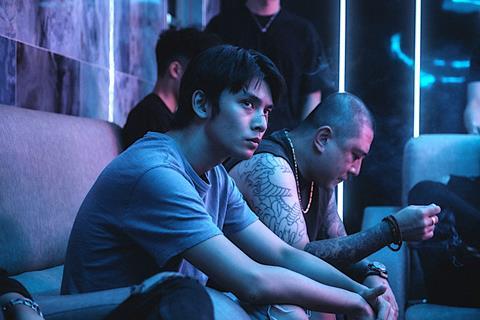A low-level Taiwanese gangster finds himself at a difficult crossroads in this 2019-set drama

Dir/scr: KEFF. Taiwan/France/US. 2024. 135mins
At first glance, the feature debut of multi-disciplinary Taiwanese-American artist KEFF treads familiar turf with its Taipei-set tale of a low-level hoodlum whose underworld affiliation threatens to scupper his fledgling romantic relationship and bring trouble to his surrogate family. Yet, incorporating the recent political upheavals and the increasing economic integration of Greater China lends wider resonance to what is ostensibly a neighbourhood story. If the protagonist of Locust never participates in a demonstration, his sudden awakening facilitates a metaphoric exploration of how power is ruthlessly consolidated through coercion, corruption and manipulation.
Simmers confidently before erupting in forceful fashion
KEFF’s second short film, Taipei Suicide Story (2020), was presented at Cannes Cinefondation, and the filmmaker should enjoy a bountiful return when Locust premieres in Critics Week. The purposeful manner in which Locust fuses his prior exploration of transient existence with suitably punchy crime elements will grab the attention of event programmers and distributors alike. Further festival engagements should follow, while Locust has plenty of potential as a specialty title - its visual style is as finely-tuned as its cogent social-political critique.
The film is set in 2019, with Taiwan’s news media fixated on the seismic anti-government protests erupting in Hong Kong. Non-verbal twenty-something Zhong-han (Liu Wei-chen) is, however, just concerned with getting by. Since moving to Taipei from the sticks, he has settled into a job at a noodle restaurant run by Ah-Rong (Yu An-shun) and his wife Yujie (Wu Yi-jung) who treat Zhong-Han like their own son. His after-hours gig is markedly different, though. Under the gleeful command of gang leader Kobe (Devin Pan), Zhong-han and fellow foot soldiers brutally collect debts from business owners in hoc to local gangster Boss Wang (Frank Lin).
Contrary to his handiness with his fists, Zhong-han exudes a sensitive aura which attracts convenience store clerk I-Ju (Rimong Ihwar). He’s also loyal to Ah-Rong and dutifully accompanies him to meetings with outwardly helpful councilman Li Jia-bao (Ma Nien-hsien) when the restaurant’s new landlord hikes the rent in a blatant bid to have the property vacated. Zhong-han believes that his two lives are entirely separate, but Ah-Rong’s situation gradually prompts the realisation that everything is, in fact, connected.
The film’s title identifies Zhong-Han as the kind of solitary insect which can change its behaviour, even turning into a pest, and the strength of Chen’s lead performance is how he silently conveys the burgeoning inner conflict that results from his character’s dual nature. This symbolism speaks to a certain outsider experience, and is emphasised early on by a night time shot of Zhong-han gazing up at trees which have been glowingly lit to look like a swarm. Backstory about Zhong-han’s rural upbringing is largely withheld until the final stretch, with the audience left to speculate about the origins of his propensity for violence, while sympathy for his marginal situation is tempered by his misguided choices.
The crossroads at which Zhong-han finds himself is represented by the polar influences of Kobe and I-Ju, both of whom like his unquestioning manner but make different assumptions about his personality. Kobe sees Zhong-han as his “deadliest gun”, whereas I-Ju uses him as a sounding board for her disappointment with life in the capital. The former plays on Zhong-Han’s need for quick cash, while the latter taps into his yearning for companionship. Both see society as unfair or flat-out rigged: Kobe’s solution is to commit crime under the wafer-thin justification of class warfare by shaking down rich kids, while I-Ju is unable to hold back tears while watching Hong Kong protest footage online.
Although the young cast members deliver credible performances, the standout turn is contributed by veteran character actor Yu, whose credits include early films by Hou Hsiao-hsien and Edward Yang. Ah-Rong’s arc is the usual case of pride coming before a fall as the restaurateur tries in vain to prevent his family establishment from being replaced by a hotpot chain. Yu underplays beautifully, and adds some touching grace notes in Ah-Rong’s final gesture to Zhong-han.
In terms of its genre beats, Locust features some bruising fisticuffs but mostly simmers confidently before erupting in forceful fashion. Scenes of thuggery are juxtaposed with Zhong-Han’s halting courtship of I-Ju, with Yoshihiro Hanno’s score easing the mood changes through its minimalist blend of foreboding electro and melancholic piano arrangements. Excellent lensing by Danish cinematographer Nadim Carlsen captures the warm appeal of Taipei’s fading traditional areas, while also mining neo-noir aesthetics from a strobe-infused afterhours scene that initially represents escapism and opportunity but comes to signify a soulless future.
Production Company: Kindred Spirit
International sales: MK2 Films, intlsales@mk2.com
Producers: Anita Gou, Siuloku O
Editing: KEFF, Siuloku O., Jenson Tay Yi
Cinematography: Nadim Carlsen
Music: Yoshihiro Hanno
Main cast: Liu Wei-chen, Rimong Ihwar, Devin Pan, Yu An-shun, Yi Jung-wu, Nien-Hsien







![The Brightest SunScreen[Courtesy HKIFF]](https://d1nslcd7m2225b.cloudfront.net/Pictures/274x183/3/5/0/1448350_thebrightestsunscreencourtesyhkiff_312678.jpg)















![The Brightest SunScreen[Courtesy HKIFF]](https://d1nslcd7m2225b.cloudfront.net/Pictures/100x67/3/5/0/1448350_thebrightestsunscreencourtesyhkiff_312678.jpg)
